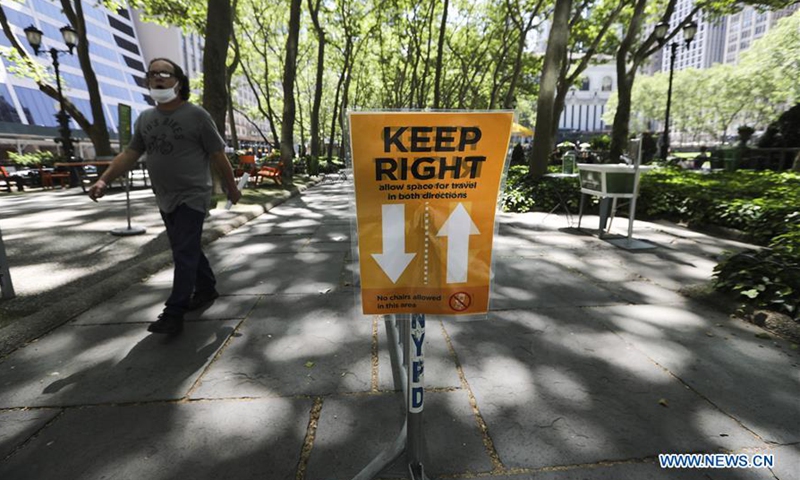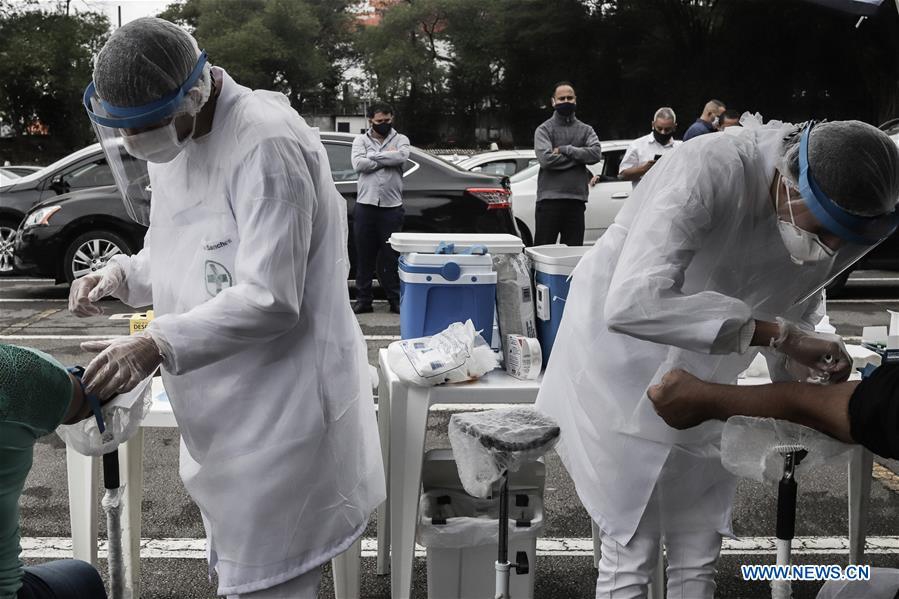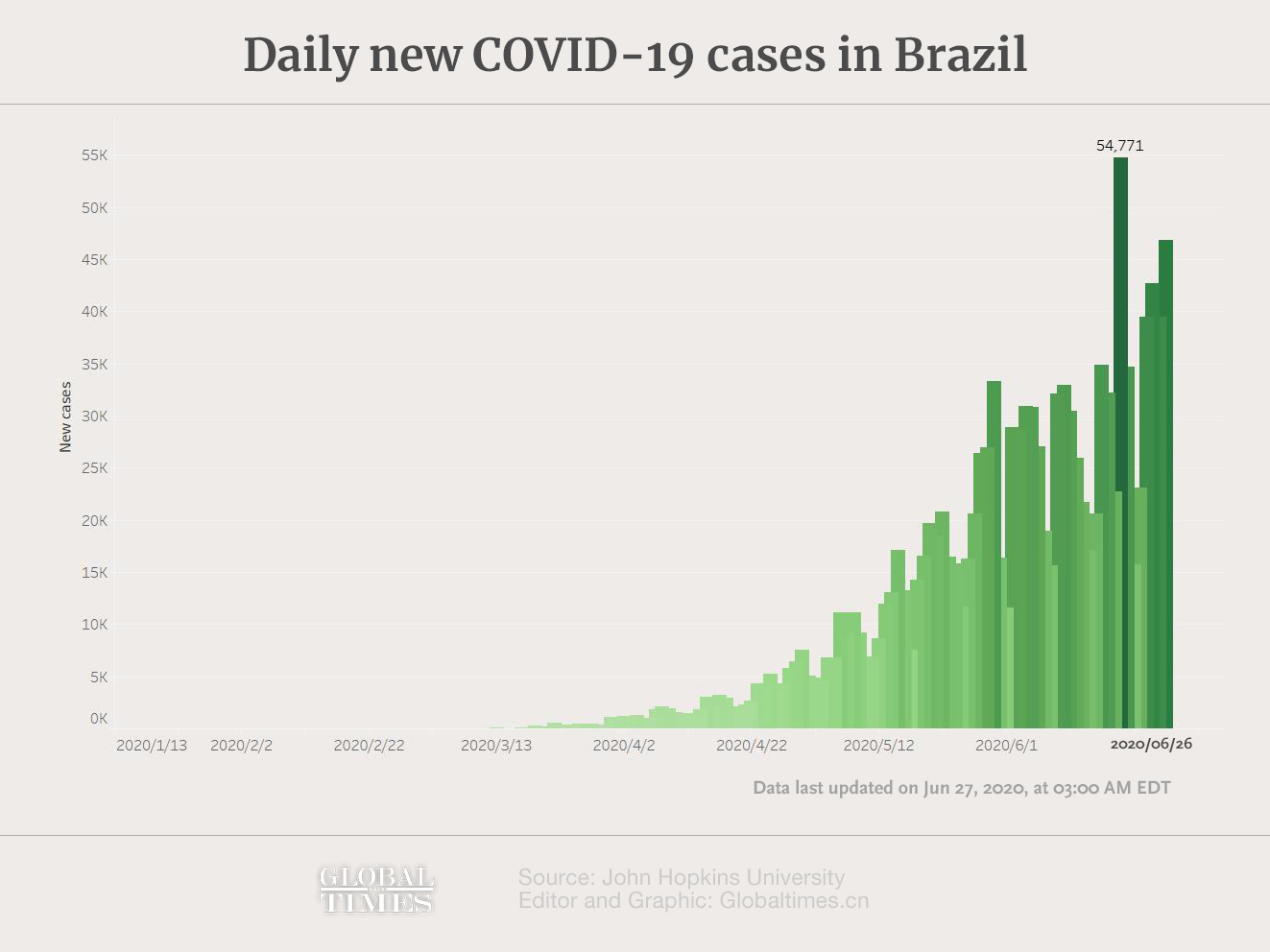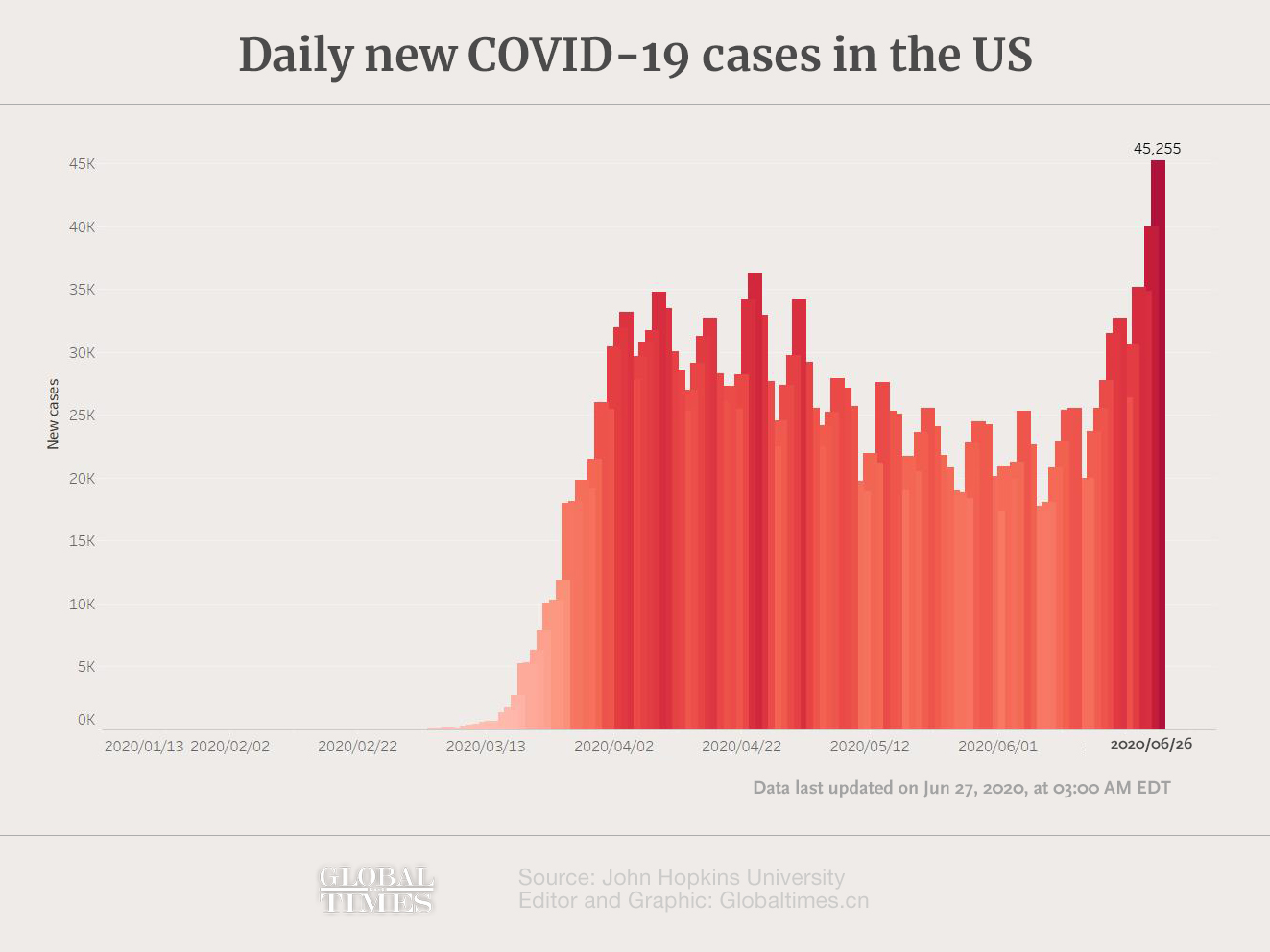US, Brazil most 'failed' COVID-19 states
By GT staff reporters Source:Global Times Published: 2020/6/27 22:48:41
To save America, 'at least put a mask on'

A man walks past a sign of "Keep Right" at Bryant Park in New York, the United States, on June 22, 2020. U.S. COVID-19 deaths surpassed 120,000 on Monday with nearly 2.3 million infections, while new cases continue to increase across the country over three months into the pandemic. (Xinhua/Wang Ying)
As global confirmed COVID-19 cases are expected to soon hit 10 million, observers said there is no question that the US and Brazil - which account for nearly 40 percent of the world's total cases - are the most prominent failed states in the fight against the virus, and their incompetence threatens global social and economic recovery.While most countries stumble to switch on the "recover" button, experts told the Global Times that the "irresponsible attitude" of the governments and top officials of the US and Brazil and their anti-science tactics not only drag the two countries into the abyss, but also dampen the future of global social and economic development.
Chief epidemiologists and experts also warned that the situation in the US and Brazil could further deteriorate due to mask-less rallies, protests and changing weather conditions, when the two countries have already witnessed record-breaking new increases in confirmed cases, with a daily increase of more than 40,000 in each country.
Liang Manchun, an associate research fellow at the Institute for Public Safety Research of Tsinghua University who has been closely following the epidemic, told the Global Times on Saturday the number of worldwide confirmed COVID-19 cases is likely to exceed 10 million on Monday, as the daily average of new confirmed cases stands between 150,000 and 200,000.
"It's more likely to continue to rise, and hard to predict when the epidemic would peak," he said.
To effectively prevent the virus from spreading, Liang stressed the importance of wearing masks. His research model shows this would prevent the novel coronavirus from spreading more than 10 times.
Data compiled by Johns Hopkins University shows more than 9.8 million infections worldwide as of press time.

Medical workers perform COVID-19 rapid tests for taxi drivers in Sao Paolo, Brazil, June 26, 2020. More than 300 Sao Paolo taxi drivers received rapid COVID-19 tests on Friday as part of the city's plan to reopen businesses. The results were to be sent to the tested individuals in five hours via smartphone message. (Xinhua/Rahel Patrasso)
Worse scenarioData shows that in the past two weeks - from June 13 to June 27 - confirmed cases in the US increased from 2 million to nearly 2.47 million, and the figure in Brazil soared from more than 828,000 to more than 1.27 million.
Liang told the Global Times the epidemic in the US is out of control, especially in the states of Florida, California and Texas.
A daily increase of 40,000 is not the highest point, and new confirmed infections in the US are expected to further rise, given that many states in the country are experiencing protests, and the presidential campaign has brought together large gatherings, Liang noted.
After the death of African-American George Floyd on May 25 due to police brutality, Black Lives Matter protests swept the US, calling for equality and end to racial discrimination.
A comparison of China and the US on the timelines of their response to COVID-19 showed that when Wuhan was put under lockdown on January 23, the US had only one confirmed case, and when the lockdown in Wuhan was lifted on April 8, there were 400,000 confirmed cases in the US.
It only took about a month for China to contain the spread of the coronavirus in Wuhan. But the coronavirus curve in the US continued to soar over the past three months.
As for Brazil, Zeng Guang, the chief epidemiologist of the Chinese Center for Disease Control and Prevention, told the Global Times on Saturday that as the country enters the winter season, the colder weather will accelerate the spread of respiratory diseases.

Infographic:GT
Zeng called on Brazil, the largest country in Latin America, not to drag down worldwide efforts in fighting the deadly virus, as many countries are already on track to resume business activity.
The epidemic situation in Peru, Mexico and Chile is also rapidly deteriorating, Zeng warned.
Observers said one of the key reasons for the failure to curb the virus are politicians in the US and Brazil who ignore scientists.
US President Donald Trump and his Brazilian counterpart Jair Bolsonaro downplayed the risks of the virus at the beginning. And when the situation worsened, they began to pin the blame on others, including China and the WHO, instead of focusing on anti-epidemic work, Li Haidong, a professor at the Institute of International Relations of the China Foreign Affairs University, told the Global Times on Saturday.
"The leaders of the two countries use 'politics' instead of 'science' to fend off the virus," he said.
Another reason is the lack of coordination between the central government and local governments, Li said.
Lü Xiang, a research fellow on US studies at the Chinese Academy of Social Sciences in Beijing, told the Global Times on Saturday that "The performance of the current US government is the worst, not one of the worst."
"COVID-19 is unfamiliar to the world, but the US and Brazil refuse to adapt to the unfamiliarity, and even suppress scientific voices, which has eventually led to this disaster," Zeng said.
Without a medical background, the two leaders even touted unproven medications and other ways, like injecting people with disinfectant.
"Their failure to curb the virus increases the uncertainty in the fight against COVID-19," Zeng said.

US Infographic:GT
Slowing global recovery
EU countries are very likely to ban travelers from the US when the bloc begins to open to international travelers, CNN reported.
That means the bloc recognizes that the US has failed to curb the coronavrius, Li said.
He added that it's "right" for the EU to make such a move as it is still struggling with pandemic prevention.
Despite the grim situation, the US and Brazil did not slow down their steps to restart their economies. However, their poor performance in virus control has persuaded others to stop visiting and welcoming them, analysts said.
While both countries are enthusiastic about restarting their economies without paying attention to virus control, Li said their major projects will have to be suspended amid the pandemic.
He said the two countries' situation will also harm global economic integration, and disrupt the world's industrial and supply chains.
"The world economy's future will be bleak if the situation continues to deteriorate. Restricting people amid the pandemic impedes the start of the economy. The world will further bear the brunt," Li said.
We need to prevent the recurrence of the epidemic and make every effort to strengthen the weak parts in the industrial chain, and maintain security and stability in our neighborhood, Lü said.